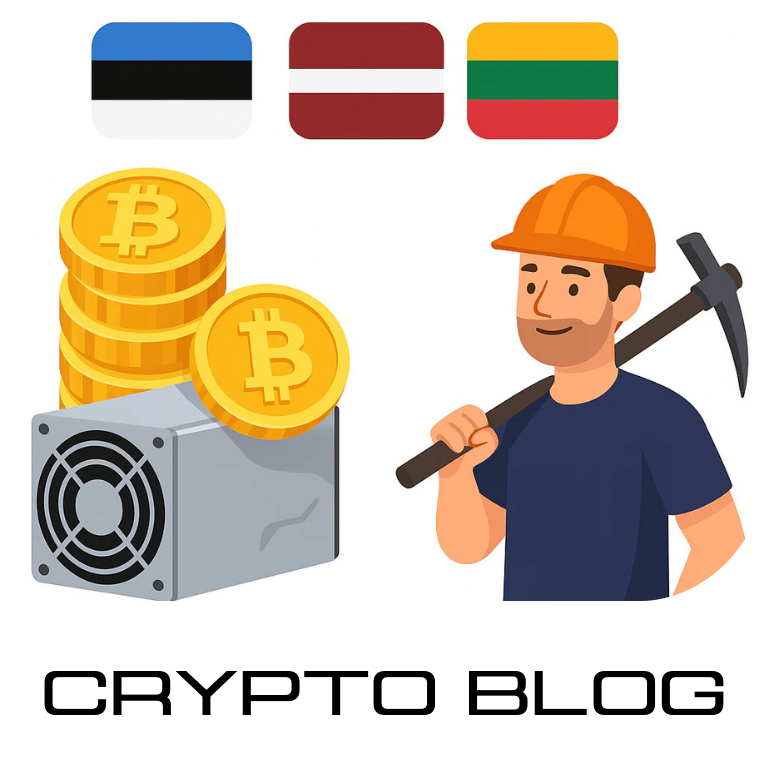🚀 Crypto Mining in the Baltics (Estonia, Latvia, Lithuania) – 2025 Overview

Cryptocurrency mining is legal and increasingly common in the Baltic states — Estonia, Latvia, and Lithuania. These countries offer a supportive legal environment, but successful mining also depends on understanding taxes, electricity costs, and infrastructure. This article outlines the key legal aspects, taxation rules, profitability considerations, and advantages of hosting services like CryptoTech.
✅ Legal Status & Regulation
Mining is fully legal across the Baltics:
🇪🇪 Estonia: Regulated by the Financial Intelligence Unit. No license required for mining alone, but tax compliance is essential.
🇱🇻 Latvia: No license needed for solo mining. Activities involving exchange services may need registration.
🇱🇹 Lithuania: Legal with no special permit. Oversight falls under the Bank of Lithuania for crypto businesses.
All three countries treat mining as a legitimate activity, requiring miners to follow general financial and AML regulations.
💰 Personal Taxes on Mining Income
Mining income is taxable in all three countries:
🇪🇪 Estonia: Taxed at ~22% as entrepreneurial income. Deductions only possible via business registration.
🇱🇻 Latvia: Taxed at 20% as capital gains. Some expense deductions possible.
🇱🇹 Lithuania: Taxed at 15% after an annual exemption of ~€2,500.
Miners must report crypto income in annual tax filings. Using crypto cards or ATMs to withdraw funds without reporting is risky and illegal.
🔌 Electricity Costs & Mining Profitability
Electricity averages ~€0.13/kWh in the Baltics — one of the largest expenses for miners. At this rate, up to 50% of mining revenue may go to power costs, especially for home miners. Modern ASICs are efficient, but profitability remains tight.
Cold climate offers an advantage: many home miners repurpose heat from devices for space or water heating. This concept, known as crypto heating, helps reduce household energy bills and increase mining ROI.
🏠 Home Mining: Pros & Cons
Home mining offers flexibility but also challenges:
Noise: ASICs are loud (75–90 dB). Noise insulation or immersion cooling is often needed.
Heat: Can warm homes in winter but needs ventilation.
Power Supply: Devices need 220V lines with 16A–30A breakers. Poor setups risk tripped circuits or fire.
Maintenance: Dust buildup and fan failure are common. Monitoring tools and hands-on upkeep are a must.
Crypto heating is especially effective for households previously using electric heating, turning what was once a cost into a revenue stream.
🏭 Industrial Mining & Hosting with CryptoTech
Large-scale mining in the Baltics is growing. CryptoTech, based in Estonia, offers reliable ASIC hosting with:
⚡ Fixed electricity rate: €0.085/kWh — far cheaper than retail prices.
🛠️ Flat hosting fee: €15/month per device.
🧰 Included support: 24/7 monitoring, uptime >97%, insured equipment.
🔧 Technical service: On-site repair, firmware updates, and immersion setup assistance.
🌍 Scalability: Capacity to host 3,100+ ASICs, with expansion options.
CryptoTech’s infrastructure ensures ideal temperatures, air quality, and power reliability — outperforming most DIY solutions. With hosting, total expenses can drop to 25–30% of revenue, nearly doubling profitability compared to home setups.
📌 Final Thoughts
Crypto mining in the Baltics is fully legal and can be profitable with proper planning. Taxes must be paid, and power costs managed carefully. Home mining is viable for small setups, especially when using heat efficiently. For larger operations or consistent uptime, CryptoTech hosting is the most reliable option in the region.
By combining smart taxation strategies, efficient infrastructure, and professional hosting, miners in Estonia, Latvia, and Lithuania can thrive even in a competitive global landscape.
